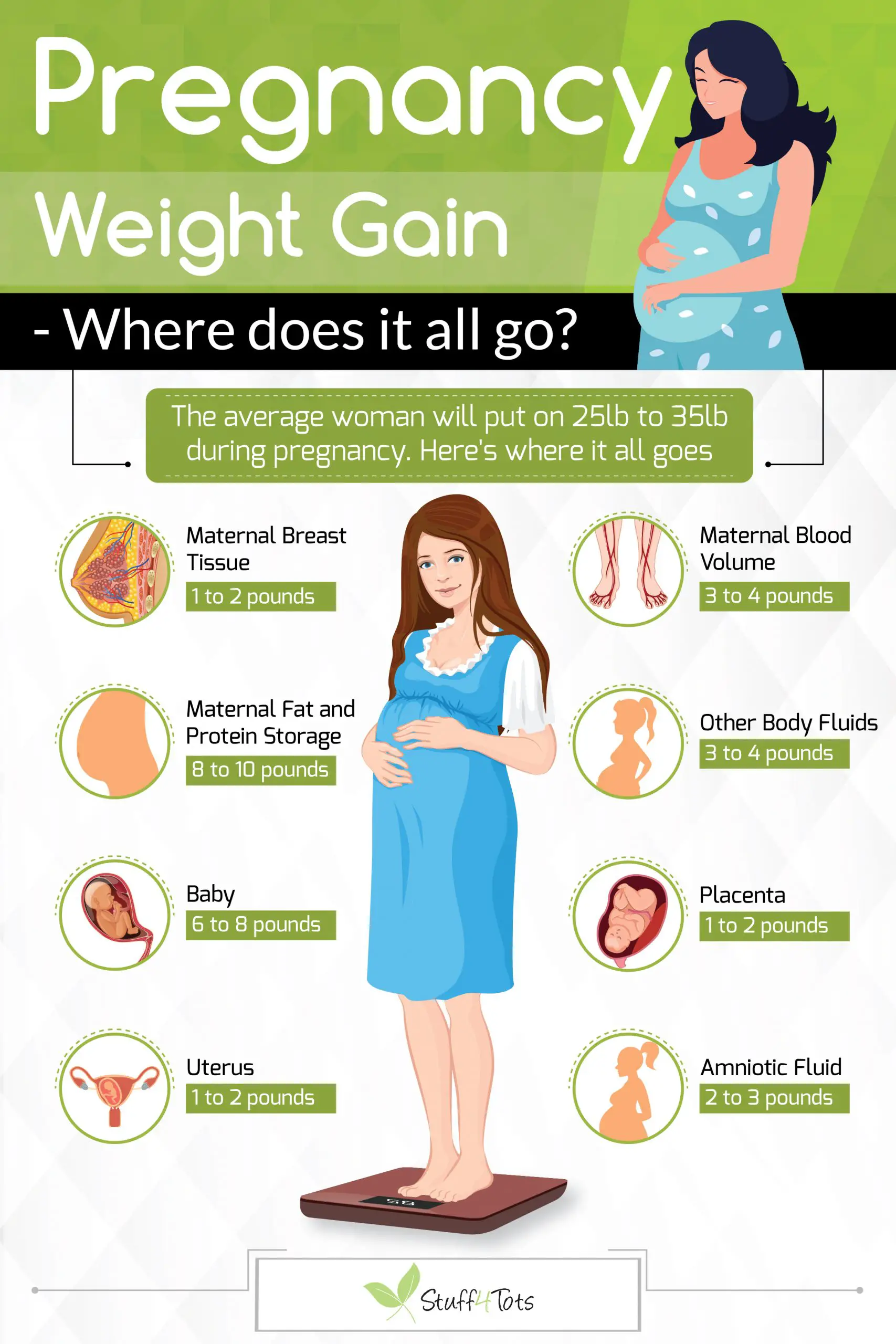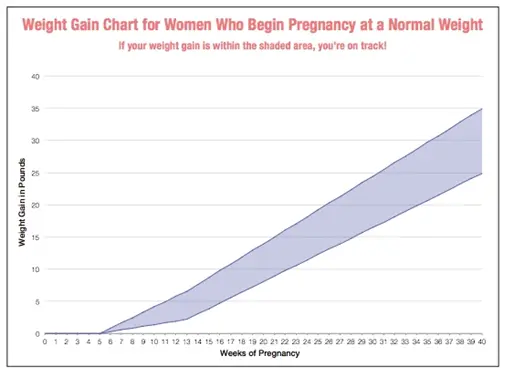Part of pregnancy is gaining weight, but how much is normal? Get to know the usual weight gain during pregnancy and learn how to keep track of it.
Gaining too much weight during pregnancy, as well as gaining too little weight, can have significant health implications for both mother and baby. Keeping track of your weight gain is vital to a healthy pregnancy.
Table of Contents
Distribution Of Weight During Pregnancy
Have you ever wondered where the extra weight that you gain during pregnancy goes? It may feel like it is all placed in your belly, but it’s not. For pregnant women who are within the normal BMI (18.5-24.9), here’s where the extra weight goes:

When Do You Start Gaining Weight During Pregnancy?
Every woman will experience weight gain differently during their pregnancy, but most women can expect to gain 1 to 5 pounds during the first trimester, and then average a weight gain of 1 pound per week for the rest of your pregnancy.
You most likely won’t notice a significant weight gain straight away, as most women do not find out they are pregnant until far into the first trimester. However, once you confirm your pregnancy, you can start tracking your weight and will more than likely notice a slight weight gain as the weeks go by.
Work Out Your Desired Pregnancy Weight
To work out your desired pregnancy weight gain, you should calculate your Basal Mass Index or BMI. This can be done by getting the square of your height in meters and dividing it by your weight.
Click here to look into this handy weighing scale online.
Secondly, find out the recommended weight gain for your BMI and check the recommended total weight gain for the corresponding BMI. This is a good guideline to use during your pregnancy to ensure you are experiencing a healthy weight gain.
BMI CHART FOR SINGLE PREGNANCY

BMI CHART FOR TWIN PREGNANCY

Pregnancy weight tracker
It is fairly simple to track your pregnancy weight gain at home, and it can be a useful tool to help your medical professional to use during checkups.
Use the below table to help you track your pregnancy weight gain through each week in your pregnancy. This will help you determine if you are averaging a normal weight gain, or if you are below or above the normal.
Weight Gain Tracker and Weight Gain Chart by CDC
Instructions:
- Write your pre-pregnancy weight in the space provided.
- Based on your week of pregnancy *, write the date and your weight that is rounded off to the nearest pound.
- Write today’s weight gain in the space provided on the weight gain tracker. To determine today’s weight gain, subtract your weight just before pregnancy from today’s weight.
Example: subtract your weight just before pregnancy (130 pounds) from today’s weight (135 pounds) to determine today’s weight gain (5 pounds).
- Print the chart and plot your weight gain in the graph by putting an “x” in the corresponding week and weight gain.
- The shaded area corresponds to the normal weight gain for pregnant women, and if your graph is outside of the shaded area, it means that you should make adjustments to your weight gain and exercise.
- Leave a blank space for your missed week and continue plotting on the chart/graph until your 40th week


Recommended Weight Gain Per Trimester for Single Pregnancy
Many women are left asking how much weight is normal to gain during pregnancy. Some women seem to remain so small, while others tend to put on weight easily.
Below is a guide on how much weight you should expect to gain during pregnancy, but it is important to remember that as long as you and your baby are healthy and have regular check-ups from a medical doctor, there should be nothing to worry about.
FIRST TRIMESTER.
There is minimal weight gain during the 1st trimester, about 0.5 to 2 kilograms or 1.1 to 4.4 pounds. It is common to lose a significant amount of weight but make sure that it is not more than 5 to 10 percent of your pre-pregnancy weight, as this might be harmful to the baby.
SECOND TRIMESTER
During the 2nd trimester, your weight gain should be steady and gradually increasing with an average of 0.2 to 0.5 kilograms (0.5 to 1 pound) per week.
THIRD TRIMESTER
Until the 3rd trimester, your weight should continue to gradually increase/ The average weight gain during this time is around 0.2 to 0.5 kilograms 0.5 to 1 pound) per week, the same as during the 2nd trimester.
Recommended Amount of Calories Per Day
A healthy pregnancy does not only include exercise but also a balanced, nutrient-rich diet. Knowing the right number of calories that should be consumed per day can help you eat healthier. Here’s the normal number of calories that should be consumed per day for the whole duration of pregnancy.
- First Trimester – 1,800 calories per day
- Second Trimester – 2,200 calories per day
- Third Trimester – 2,400 calories per day
Importance of Gaining Weight Within the Normal Range
It is important to gain weight within the normal range, to refrain from delivering a too-small-for-gestational-age baby because of insufficient nourishment for the fetus. Babies that are born too small may have difficulty in feeding and may have developmental delays.
Babies who are born underweight also have a hard time breastfeeding. They might not be strong enough to suckle and latch for extended periods, and this could have a negative effect on your milk supply in the beginning, which could lead to problems breastfeeding in the future.
Gaining Too Much Weight During Pregnancy
While gaining too little weight during pregnancy can have health risks, gaining too much weight during pregnancy can also have some negatives effects.
Too much weight gained during pregnancy can cause health issues for both baby and mother. If a woman gains too much excess weight, there is a higher risk that her baby will be born too large. During labor, this can lead to vaginal tears and the need for a Caesarean section, and later on in life, it can contribute to obesity in the child.
After birth, excess weight gain can be difficult for the mother to lose, and this might also be a contributing factor to obesity in the mother herself, which can pose many health issues.
Not all women experience pregnancy symptoms, but those who gain excessive weight during pregnancy are more likely to suffer from achy joints, varicose veins, and heartburn. The extra weight puts additional pressure on your body, making it more difficult for blood and fluids to flow. This decrease in circulation can lead to hemorrhoids, leg cramps, physical exhaustion, and backaches.
Keeping a count on your pregnancy weight gain using a tracker is a great way to ensure you stay ahead of what is healthy and what might cause issues for both you and your baby, during pregnancy and well after birth.
Rapid Weight Gain During Pregnancy
Rapid weight gain during pregnancy is more prominent among women who were overweight before falling pregnant. If you find that you are gaining weight rapidly during pregnancy, speak to your health professional and try to adjust your diet, while still having all the nutrients you need, to stop excessive weight gain.
Gaining weight too fast in pregnancy can lead to health problems for mothers, who will more than likely suffer from backache, heartburn, and cramps. This might also pose a problem if the baby is gaining weight too quickly as well.
How To Control Weight Gain During Pregnancy
You should only worry about controlling your weight gain during pregnancy if you are putting on weight rapidly. Without having to go through drastic changes, there are some ways to try and control your weight safely.
Exercise
Be sure to get the go-ahead from your medical practitioner before exercising during pregnancy, but for most women, exercising is a good way to keep active, improve pregnancy symptoms and help to lose weight.
Moderate exercise can be done a few times a week to help burn off extra calories. This does not need to be a tough workout routine, but many exercises are safe for pregnant women to practice.
Keeping active by walking or swimming is a great way to keep extra weight off during pregnancy. It is low-stress on the body, it improves moods and works towards keeping the excess weight down.
Exercising during pregnancy has many benefits for both mom and baby, but be sure to speak to your doctor to make sure it is safe for you to exercise, and try to keep a light exercise routine throughout your pregnancy.
Many workout programs designed for women not only help to keep weight down, but they strengthen the body in preparation for childbirth. A woman who exercised during pregnancy is more likely to have an easier labor and a quicker recovery post-birth.
Proper Food Choices ForPregnant Women

To Eat
- Eat frequently, as many as 5 to 6 meals per day.
- Have an easy snack on hand such as fresh fruits and vegetables. These are filled with vitamins and are low in calories and fat.
- Choose reduced-fat dairy products. Have at least 4 servings of milk every day. Choose low-fat or fat-free cheese or yogurt.
- Use natural sweetener for your food or drinks.
- Lessen salt in your foods as this can cause retention of water.
- Instead of frying, try baking, broiling, grilling and boiling your food as these are healthier preparation methods.
- Eat at places that offer salads, soups, and vegetables.
Not To Eat
- Do not eat foods or drinks that contain sugar and artificial sweeteners.
- Read the label before eating or drinking it. Some foods are high in calories.
- Food and drinks that have corn syrup as an ingredient are not advisable.
- Avoid eating junkfood such as chips, cake, cookies and candies.
- Minimize using fat in your food. If you can, use low-fat versions of these foods.
- Avoid eating fast food.
Is it alright to Lose weight?
Some moms who were previously overweight before pregnancy might be advised to lose some weight as they are more prone to complications during pregnancy and labor. While most of the time, mothers who do not have any problems during pregnancy, are advised to gain weight within the normal range.
Excessive dieting is not recommended during pregnancy, as you will be taking much-needed nutrients away from yourself and your baby. Instead, your health practitioner should give you a guideline on the best way to lose weight safely.
Why Exercise When I Should Be Gaining Weight?
Exercise is not only for those who needed to lose weight, but it should be a daily routine of pregnant women as it can increase your overall health and at the same time prepare you for labor and delivery.
It is advised to have a moderate-intensity exercise for up to 150 minutes (2 1/2) for the whole week.
Tracking Your Weight During Pregnancy
You are able to give yourself control over tracking your weight, and this, in turn, alerts you to any issues you might be facing regarding gaining too much or too little weight.
A healthy weight gain is a good thing, and keeping a track of your weight gain is important to ensure a healthy pregnancy.
Click here to look into this handy weighing scale online.
Featured image attribution details:
- A close-up view of the belly of a pregnant woman in red, who is holding scales in her hands
- Published on December 29, 2019 by Volodymyr Hryshchenko on Unsplash
Related Articles:

Astley Golosinda
My background is in the field of medicine and I have a Bachelors Degree in Nursing. My thesis in Nursing was also published on Journal of Gerontology
For the past 4 years, I continued my studies and dedicated my time to acquiring a Doctorate of Medicine. I was a working student all throughout my post-doctorate degree. I have clinical experience in the hospital both as a nurse and now as a medical student.




